
Red Dwarf is a British science fiction comedy franchise created by Rob Grant and Doug Naylor, which primarily consists of a television sitcom that aired on BBC Two between 1988 and 1999, and on Dave since 2009, gaining a cult following. The series follows low-ranking technician Dave Lister, who awakens after being in suspended animation for three million years to find that he is the last living human, and that he is alone on the mining spacecraft Red Dwarf—save for a hologram of his deceased bunkmate Arnold Rimmer and "Cat", a life form which evolved from Lister's pregnant cat.
Battlestar Galactica is an American science fiction media franchise created by Glen A. Larson. It began with the original television series in 1978, and was followed by a short-run sequel series, Galactica 1980, a line of book adaptations, original novels, comic books, a board game, and video games. A reimagined version aired as a two-part, three-hour miniseries developed by Ronald D. Moore and David Eick in 2003, followed by a 2004 television series, which aired until 2009. A prequel series, Caprica, aired in 2010.

Cosmos: A Personal Voyage is a thirteen-part, 1980-1981 television series written by Carl Sagan, Ann Druyan, and Steven Soter, with Sagan as presenter. It was executive-produced by Adrian Malone, produced by David Kennard, Geoffrey Haines-Stiles, and Gregory Andorfer, and directed by the producers, David Oyster, Richard Wells, Tom Weidlinger, and others. It covers a wide range of scientific subjects, including the origin of life and a perspective of our place in the universe. Owing to its bestselling companion book and soundtrack album using the title, Cosmos, the series is widely known by this title, with the subtitle omitted from home video packaging. The subtitle began to be used more frequently in the 2010s to differentiate it from the sequel series that followed.
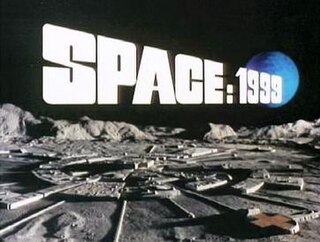
Space: 1999 is a British science-fiction television programme that ran for two series from 1975 to 1977. In the opening episode, set in the year 1999, nuclear waste stored on the Moon's far side explodes, knocking the Moon out of orbit and sending it, as well as the 311 inhabitants of Moonbase Alpha, hurtling uncontrollably into space. Space: 1999 was the last production by the partnership of Gerry and Sylvia Anderson and was the most expensive series produced for British television up to that time. The first series was co-produced by ITC Entertainment and Italian broadcaster RAI, while the second series was produced solely by ITC.

From the Earth to the Moon is a twelve-part 1998 HBO television miniseries co-produced by Ron Howard, Brian Grazer, Tom Hanks and Michael Bostick. In docudrama format, it tells the story of the Apollo program during the 1960s and early 1970s. Largely based on Andrew Chaikin's 1994 book, A Man on the Moon, the series is known for its accurate telling of the story of Apollo and the special effects under visual director Ernest D. Farino. The series takes its title from, but is not based upon, Jules Verne's 1865 science fiction novel From the Earth to the Moon.

Spearhead from Space is the first serial of the seventh season in the British science fiction television series Doctor Who, which was first broadcast in four weekly parts on BBC1 from 3 to 24 January 1970. It was the first Doctor Who serial to be produced in colour and the only one to be made entirely on 16 mm film.
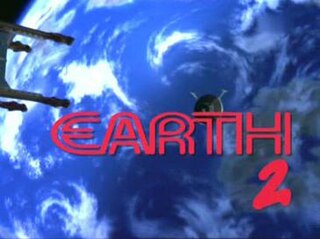
Earth 2 is an American science fiction television series which aired on NBC from November 6, 1994, to June 4, 1995. The show was canceled after one season of 21 episodes. It follows the journey and settlement of a small expeditionary group called the Eden Project, with the intent to journey to an Earth-like planet called G889 in an attempt to find a cure to an illness called "the syndrome". The series was created by Billy Ray, Michael Duggan, Carol Flint, and Mark Levin, produced by Amblin Entertainment and Universal Television, and filmed primarily in northern New Mexico around the Santa Fe area. The series' music was composed by David Bergeaud, and the executive producers were Duggan, Levin, and Flint.

Galactica 1980 is an American science fiction television series and a spin-off from the original Battlestar Galactica television series. It was first broadcast on ABC in the United States from January 27 to May 4, 1980, lasting for 10 episodes.
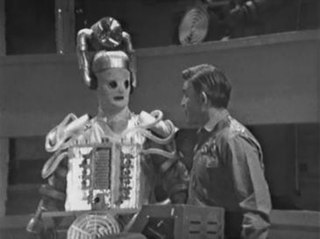
The Tenth Planet is the partly missing second serial of the fourth season in the British science fiction television series Doctor Who, which was first broadcast in four weekly parts from 8 to 29 October 1966. It was William Hartnell's last regular appearance as the First Doctor, and the first story to feature the process later termed "regeneration", whereby the lead character, The Doctor, undergoes a transformation into a new physical form. Patrick Troughton makes his first, uncredited appearance as the Second Doctor.
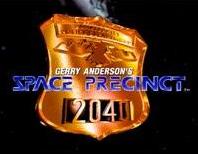
Space Precinct is a British television series that first aired in syndication in the United States between 1994 and 1995. In the UK, it was first shown on Sky One between March and August 1995, and later BBC Two from September 1995 to March 1996. Many US stations scheduled the show in late night time slots, which resulted in low ratings and contributed to its cancellation. The series was based on an unaired 1986 pilot film titled Space Police starring Shane Rimmer.

Voyage is a 1996 hard science fiction novel by British author Stephen Baxter. The book depicts a crewed mission to Mars as it might have been in another timeline, one where John F. Kennedy survived the assassination attempt on him on 22 November 1963. Voyage won a Sidewise Award for Alternate History, and was nominated for the Arthur C. Clarke Award in 1997.
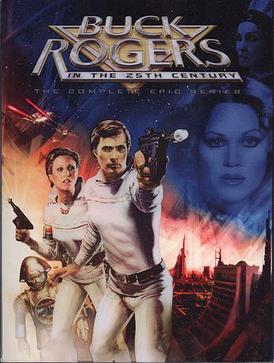
Buck Rogers in the 25th Century is an American science fiction adventure television series produced by Universal Studios. The series ran for two seasons between September 1979 and April 1981 on NBC, and the feature-length pilot episode for the series was released as a theatrical film before the series aired. The film and series were developed by Glen A. Larson and Leslie Stevens, based on the character Buck Rogers created in 1928 by Philip Francis Nowlan that had previously been featured in comic strips, novellas, a serial film, and on television and radio.

Space Odyssey: Voyage to the Planets, marketed as Voyage to the Planets and Beyond in the United States, is a 2004 two-part fictional documentary created by Impossible Pictures and produced by BBC Worldwide, Discovery Communications and ProSieben. Space Odyssey chronicles a fictional crewed voyage throughout the Solar System, which is used to convey scientific information on spaceflight and on the different planets. The programme was initially announced under the title Walking with Spacemen as an instalment in the Walking with... franchise of documentaries. Though the title was changed before release and its connection to the other Walking with... programmes was removed, it was broadcast under the original title in Canada. The special effects and scientific accuracy of Space Odyssey was praised by critics, though some criticism was leveled at the storylines and drama portions of the programme.

"Saga of a Star World" is the pilot for the American science fiction television series Battlestar Galactica which was produced in 1978 by Glen A. Larson. A re-edit of the episode was released theatrically as Battlestar Galactica in Canada before the television series aired in the United States, in order to help recoup its high production costs. Later, the standalone film edit was also released in the United States.
Christopher Riley is a British writer, broadcaster and film maker specialising in the history of science. He has a PhD from Imperial College, University of London where he pioneered the use of digital elevation models in the study of mountain range geomorphology and evolution. He makes frequent appearances on British television and radio, broadcasting mainly on space flight, astronomy and planetary science and was visiting professor of science and media at the University of Lincoln between 2011 and 2021.

In the Shadow of the Moon is a 2007 British documentary film about the United States' crewed missions to the Moon. After premiering at the 2007 Sundance Film Festival, where it won the World Cinema Audience Award, it was given a limited release in the United States on 7 September 2007, and in Canada on 19 October.
Rocket Science is a miniseries first released in 2002-2003, chronicling the major events in the American-Soviet space race, starting from the first hypersonic rocket planes through the development of human space flight, culminating with the mission by mission history of Projects Mercury, Gemini and Apollo. The series features interviews with X-1 and X-15 pilots Chuck Yeager, Scott Crossfield and Pete Knight, astronauts Gordon Cooper, Wally Schirra, Scott Carpenter, Gene Cernan, Frank Borman, James Lovell, Buzz Aldrin and Alan Bean, flight controllers Gene Kranz, Christopher Kraft, John Hodge and Sy Liebergot, engineers Günter Wendt, Max Faget, John Houbolt, Bob Gore, Robert Sieck and Richard Dunne, authors Arthur C. Clarke, Andrew Chaikin, Robert Godwin, Spider Robinson and Robert J. Sawyer, historians Paul Fjeld and Professor John Lienhart, Dr Raymond Puffer and Dr James Young, Manhattan Project physicist Hans Bethe, head of the Lovelace Clinic Dr. Donald E. Kilgore, Dr David Simons of Holloman AFB, Colonel Joe Kittinger, and broadcaster Walter Cronkite, among others. While focusing mainly on the American side of the race, the series also covered major Soviet achievements through every key phase of the 1950s and 1960s Space Race.
With the advent of robotic and human spaceflight a new era of American history had presented itself. Keeping with the tradition of honoring the country's history on U.S. postage stamps, the U.S. Post Office began commemorating the various events with its commemorative postage stamp issues. The first U.S. Postage issue to depict a U.S. space vehicle was issued in 1948, the Fort Bliss issue. The first issue to commemorate a space project by name was the ECHO I communications satellite commemorative issue of 1960. Next was the Project Mercury issue of 1962. As U.S. space exploration progressed a variety of other commemorative issues followed, many of which bear accurate depictions of satellites, space capsules, Apollo Lunar Modules, space suits, and other items of interest.

The first season of the American science-fiction television series Star Trek, originally created by Gene Roddenberry, premiered on NBC on September 8, 1966, and concluded on April 13, 1967. The season debuted in Canada on CTV two days before the US premiere, on September 6, 1966. It consisted of 29 episodes, which is the highest number of episodes in a season for the original series of Star Trek. It features William Shatner as Captain James T. Kirk, Leonard Nimoy as Spock, and DeForest Kelley as Leonard McCoy.














